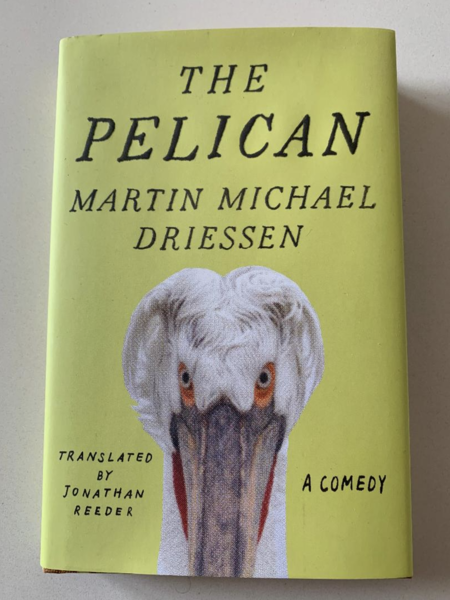It may not be wholly or completely so but there is good case to be made that life is, simply by virtue of its underwhelming existence, more than a little disappointing.
Quite what it is most of us are expecting is never really clear but if pushed, there’s a good chance we’d say that we expected blissful joy, mutually satisfying relationships or the sort of bucolic contentment of which poems are written, songs are sung and plays inspired and performed.
That’s not too much to ask is it?
The two protagonists of Dutch writer (and opera and theatre director) Martin Michael Driessen’s absurdist but surprisingly heartfelt black comedy The Pelican (with translation into English by Jonathan Reeder) certainly don’t think so, labouring as they are under the treasured auspices of Tito’s Yugoslavia in what turns out to be its soon-to-be civil war tumbling dotage.
The unnamed Croatian coastal town in which they live, which is winningly described as “too small and not attractive enough to compete with cities likes Zadar and Dubrovnik”, is like much of the cobbled-together communist collective utopia it is a part of severely lacking in much that one could actually call Utopian.
At least as far as it extends to their lives; perhaps the people of Zagreb are awash in happiness and dreamy bliss but here in their small town, with its only claim to fame being a funicular that goes up the mountain and back, and which is only ever really in use on one important day of the year, the kind of existential glories that have been promised them for their service to the Fatherland have yet make their presence felt.
“As he sat atop the gray hill, chewing his salami and gazing out over the unrippled sea and the town at his feet and the straight double tracks of his funicular, his head was clear. This was Josip’s preferred state of mind, because, he knew, contemplation only led to worry; about his child, and about how the woman who was its mother could further torment him. If nothing happened, then at least nothing bad happened.” (P. 6)
So, in their quietly-mourned absence, funicular railway operator and adulterer Josip, a veteran of the Second World War with his best friend Mario, and Andrej, a younger man who is the local postal delivery man and who sees nothing wrong with helping himself to gifts, money and letters as payment for services rendered, decide to have a go at trying their own small slices of paradise.
All of which may have come to much of nothing, save for the fact that the two men, who don’t really know each other, despite the town’s small size, hilariously end up blackmailing each other.
Well, it’s hilarious for readers who watch all the effort the two men go to – Josip is blackmailing Andrej over his thieving ways while in return Andrej is extorting money from Josip over his photographed trysts with the beautiful Jana from Zagreb – only to have the same money essentially going back and forth in a weirdly circular fashion, with no one particularly advantaged by an arrangement that comes to dominate their lives.
All, by the way, while the other remains completely unaware of the intimacies, joys and sorrows of the other’s lives and even the fact that they are doing this to each other.
But then, of course, as they must for the narrative to have even more sting in its gloriously satisfying tale, they meet and become friends, setting up the strangest of all friendships which is warm, supportive and caring in the exactly the kind of way that they have been fruitlessly trying to achieve through their Pyrrhic blackmailing “victories”.
The Pelican may thus seem rather bleakly depressing with all that accumulative disappointment piling on top of itself like so much existential snowfall, but Driessen manages to inject some warm and interesting humanity into proceedings by virtue of two lead characters who are actually reasonably likable.
They’re flawed as hell and quite unable to make something decent of their lives, at least until one pivotal moment that has lasting effects on them both, but they are, in ways we may not like to admit to but would be all the better for doing so, very relatably human.
All they want from life is the chance to be actually happy; Josip wants relief from his emotionally unstable wife who has seen adultery in every single thing her husband does from the moment they said “I do” – his only affair has been with Jana after years of emotional and social isolation – while Andrej wants a friend, someone he can call his own, who gives a damn whether he lives or dies.
This turns out to matter even more to the latter man than even he himself realises, but that aside, all they want is what any of us which is to feel like life can deliver on at least a little of its childhood promise, and it is that, rather than any lingering or toxic malignancy, that informs everything they do.
“Andrej had been looking forward to this undertaking for weeks. Tudjman [Josip] had postponed it several times due to the weather, but recently Andrej had seen plenty of lights from other fishing boats far off the coast. Maybe Tudjman was ruffled by that last blackmail note. He needn’t worry, Andrej thought, because he had no intention of collecting the money from under the concrete bock. That was behind them now. He regarded Josip Tudjman as a friend, and friends did not do such things to one another.” (P. 151)
That doesn’t mean, of course, that their actions don’t have deleterious consequences, but right throughout The Pelican Driessen keeps his storytelling eye firmly on the inherent fallen, broken, foible-rich humanity that each man brings to the story and how they exist in a world where people resort to all kinds of measures, extremist, paranoid or otherwise, to try to make sense of life and its great yawning chasm of ever-present disappointment.
There is humour to be, but it is mostly black and unremittingly bleak, tempered by small moments of joy such as the ultimately doomed but great while it lasts friendship of Josip and Andrej who find out, too late alas, that maybe friendship between the two of them could have been just what the other one needed.
As a rumination on life and its many contrary vagaries, The Pelican is a clever piece of richly-informed writing that uses its oft-quirky and jaunty perspective on events to dive deep into the way life dangles so much before us early on before pulling it back, leaving us wondering where all of the expected good things have gone.
It’s precisely because Josip and Andrej are so groundedly normal that you warm to The Pelican, a novel which doesn’t pretend life is a carnival ground ready for us to ride and enjoy its many attractions but which also is honest about the fact that there is great joy to be had amongst the disappointment if only we care to look in all the right places.
No prizes for guessing that that is precisely what most of us, including Josip and Andrej don’t do, or don’t do early or thoroughly enough, leaving us dangling frustratingly close to the very things that could have made us truly happy, or at least happier, than we end up being.

